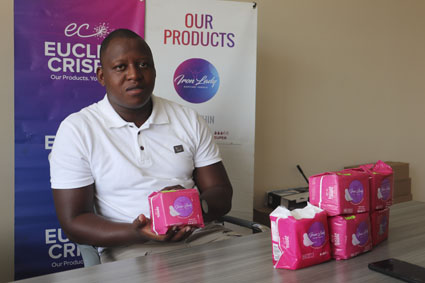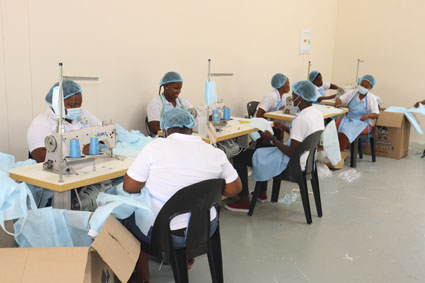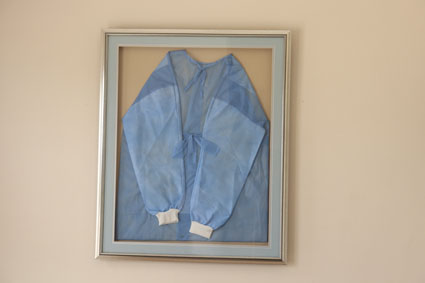Moje aims to empower through sanitary pads
22 Nov 2020
Mr Otsile Moje from Manamakgota ward in Mochudi is a busy young man. An appointment for 10 am turned was honoured about an hour later, not out of sloppiness though, but a result of his busy schedule.
“My apologies, I had to drop something at the ministry of health and didn’t anticipate to take this long, my Mondays are normally hectic,” the well-built Mr Moje instantly apologised, before ushering reporters through his factory into his modest office.
His journey into business has been driven mostly by compassion. “I really like business, but it has been turbulent this year,” he said settling in.
Narrating his journey into business which started a few years back when he was still in the army, perhaps after he realised that he was in the wrong profession, Mr Moje said ‘i realised, luckily for me at an early stage in my life and career, that being an employee was not for me.
I walked into the army straight from completing my BGCSE, perhaps before I really had a chance to map my career path. I spent just six years there before quitting,’ without a speck of regret.
Mr Moje said that while still at Botswana Defence Force, he was stung by a charity bug, and in 2015 formed a charitable organisation called Moje Foundation, which focused on women empowerment in Africa.
He said that his organisation helped him earn a place at the Young African Leaders Initiative (YALI), ‘an initiative that seeks to inculcate the culture of business in young Africans.’
“The event was held in South Africa in 2017. It really helped breathe morale into me because it happened just two years after I formed the charity organisation. I developed interest in menstrual hygiene after I noted that many school going girls in Africa, even in Botswana struggle to access or can’t afford sanitary pads, especially in rural areas,” he said.
He said that the project nurtured his already existing soft spot for women empowerment, and that was when he took a decision to manufacture sanitary pads for this concerned group, free of charge.
“My hope was that through my organisation, I would find donors or funding to set up a factory to push up this noble and charitable gesture.
Unfortunately, I could not find any donors, nor could I fund it from my pocket because the machine that manufactures pads cost around P2 million at the time,” he said.
Mr Moje said that after failing in his endeavour to seek donors through his charitable organisation, he then resorted to forming a company, Euclea Crispa in 2019, just after leaving the army, a move that he hoped would make enough profit to allow him to sponsor women empowerment.
He said he then applied for CEDA funding, which answered positively by funding him to the tune of P2.9 million, where he then set up at Selebi Phikwe.
He said that the business was now fully set up and only delayed by some few logistical issues before full operation.
He however, said that his confidence in the potential of the factory was still unwavering.
“The aim is to manufacture in excess, which would enable me to sell to the rest of the populace at a profit and use that to give to the concerned group for free through my charitable organisation, although without stifling the business,” he said.
He said that immediately after forming his company, he was invited through the connections at YALI to a campaign dubbed Free the Period in Rwanda the same year, where he donated a total of 5 000 sanitary pads to the Rwandese.
“The occasion was a really good timing.
It came at the right time for me because it was just when the Rwandese government was introducing an initiative to provide free sanitary pads to school going children.
So, the Rwandese Development Board approached me because they wanted a company that could set up there and produce pads locally, which would be a cheaper alternative to importing,” he said.
Mr Moje said that at the moment he was still in negotiations with the Rwandese government on whether to set up factory there or export from Botswana.
He said that if it were not for the COVID-19 outbreak, the negotiations would most likely have been concluded by now.
He said that apart from Rwanda, he was also in negotiations with governments of Namibia and Zimbabwe.
Back to Rwanda, Mr Moje said that the government was looking at a monthly supply of about 3.5 million units, a drop in the ocean looking at the capacity that his machinery could churn-out at full production, about 250 units per minute.
Regarding the local market, Mr Moje indicated that his product was not yet out in the open market.
“Once Batswana are used to a product it is not easy for them to change. So they are still too confident in the sanitary pads produced by common brands.
We are still in negotiations with some local retailers to have our product in their shelves, and that is when we would be able to truly gauge the possibility of wrestling the market off the established brands,” he said.
Mr Moje however, suggested that government needed to look into imposing restrictions and standards on products, particularly where imports had replaced domestic production as an attempt to give a push to Pusha BW programme and reduce the widening trade gap.
“Various ministries need to analyse data and compile lists of products which are produced domestically”, he said.
Mr Moje said that at the moment he has diversified his business into surgical gowns manufacturing, which are produced at Phakalane just outside Gaborone.
He said that this was in an effort to assist government to fight the COVID-19 pandemic by locally supplying what was required than having to import it.
He however, said that at the moment, no agreement had been entered into with government concerning supply.
Moje’s sanitary pads factory, which currently operates from South Africa has 34 employees, while the local production of surgical gowns had employed 19, including four who people living with disabilities.
As he rises from his comfortable chair to usher us out, he murmurs out something, but the decibels are too low to be detected.
Perhaps he was just thinking aloud of the future of his business once the COVID-19 pandemic is contained and the international borders opened, the only situation that he believes could really give his business a kick. ENDS
Source : BOPA
Author : Olekantse Sennamose
Location : PHAKALANE
Event : Interview
Date : 22 Nov 2020








